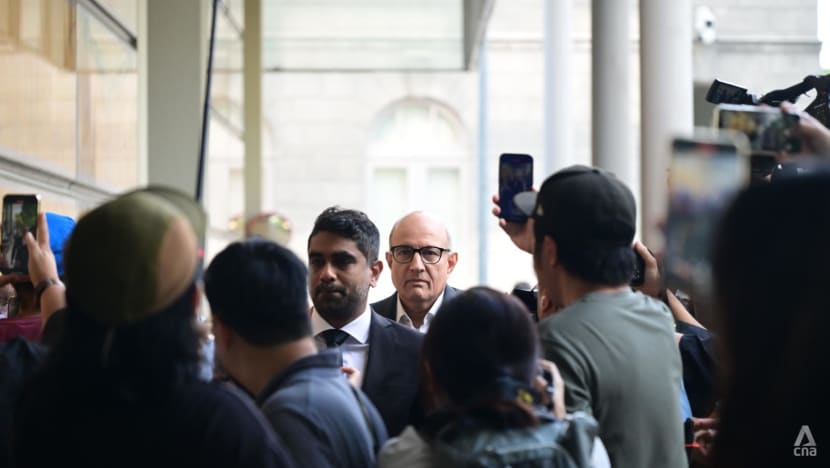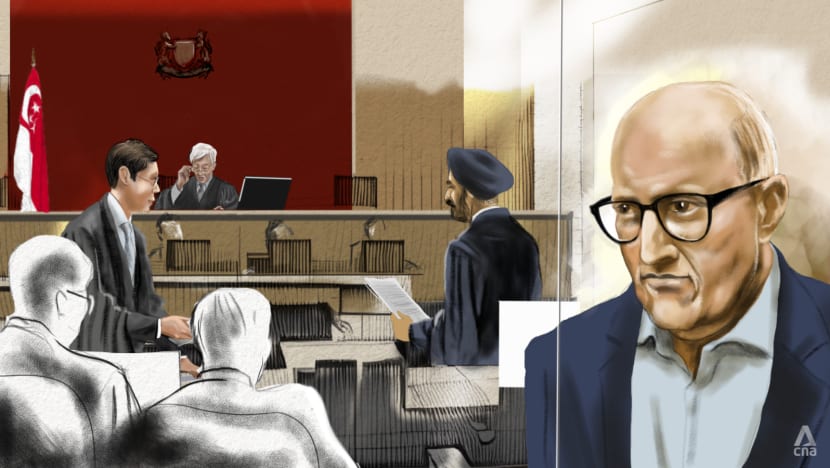Commentary: The implications of Iswaran’s criminal conviction after an unexpected twist
Former minister S Iswaran’s guilty plea ended his trial on its first day. SMU associate professor of law Eugene K B Tan weighs in on the implications as the General Election looms.

S Iswaran arrives at the High Court for the start of his trial on Sep 24, 2024. (Photo: CNA/Wallace Woon)

This audio is generated by an AI tool.
SINGAPORE: A protracted legal battle royale was expected, but the much-anticipated trial of former minister S Iswaran ended almost as quickly as it began on Tuesday (Sep 24). It was an unexpected twist, perhaps even anti-climactic.
He pleaded guilty to four Penal Code Section 165 charges (for taking gifts as a public servant from someone with whom he has an official business relationship) and one charge for the obstruction of justice. Sentencing will take place on Oct 3.
It is very likely that a plea bargain was proposed and negotiated. It does not matter which party initiated it – ultimately, both parties agreed to it.
The Public Prosecutor (PP) exercised its prosecutorial discretion, a constitutional power, to amend two charges originally under the Prevention of Corruption Act (PCA).
DID THE PROSECUTION GO EASY ON ISWARAN?
However, it would be erroneous to conclude that the PP has gone easy on the former Member of Parliament (MP) by proceeding with fewer charges (five, down from 35) and less severe offences (amended from the PCA to Section 165 Penal Code charges. Far from it. The PP’s arguments in court do not point to a change of heart.
For example, the PP (and the government) regard Section 165 Penal Code as a corruption offence, serving a more targeted purpose of ensuring that public servants do not put themselves in a position of conflict of interest knowingly or otherwise in the course of their official duties. Iswaran, however, took the position that in pleading guilty to Section 165 Penal Code charges, he was not pleading guilty to any corruption offence.
Although both sides disagree vehemently on whether Section 165 of the Penal Code is an offence of corruption, Iswaran’s guilty plea to the amended charges suggests that each side largely secured what they sought.
For the PP, the guilty plea removes the uncertainty of whether a conviction can be secured, given the more onerous evidential burden under the PCA to prove the receiver agreed to do something that benefits the giver. Iswaran pleaded guilty to obtaining items, such as F1 hospitality suite tickets, a private jet flight and a hotel stay “for no consideration” under the amended charges.
In criminal prosecutions, the PP acts in the public interest and this includes not securing a conviction at all costs. With about 70 hearing days scheduled originally, the abrupt end to the case also saves significant public resources while holding the accused accountable for his actions.
For Iswaran, he will likely be subjected to a lower sentence than if he had contested the original set of charges and lost. The PP determinedly made the case for 6 to 7 months’ jail while the defence strenuously argued for no more than 8 weeks, if a jail term is warranted.
The High Court will decide what is the appropriate penalty, taking into consideration Iswaran’s degree of culpability, the abuse of trust while holding high public office, and mitigating factors such as the disgorgement of the gifts and entering a guilty plea at the outset of the trial.
The court will also take into consideration the 30 other charges in sentencing. Iswaran consented to this for the purposes of sentencing. He is considered to have admitted to these charges even though he is not convicted of them.
MORE POLITICS THAN LAW?
Neither is this is a case of both sides to trying to conclude the matter hastily. With the current Parliament having less than 11 months left of its five-year term, segments of the online sphere speculated that the ruling People’s Action Party (PAP) is concerned that a lengthy trial will not help its election cause and suck the oxygen out of its campaign.
Even if one or both parties may want the matter to be disposed of quickly, they have no influence or control over it. Either or both parties may file appeals on the penalty after the Oct 3 sentencing, so this case will continue to make the headlines next year.
Had the prosecution been driven by political considerations, it would have agreed to a minimal custodial sentence to avoid an appeal.

In any case, the courts will not be dictated to by putting this case on an expedited pathway and they will certainly not allow the timing of an upcoming election to be a factor in trial and appeal process and timelines.
Moreover, the eventual outcome of this criminal case will unlikely sway the position of those who have decided what it says about the ruling party and the political leadership.
EMPHASISING INCORRUPTIBILITY AND HIGH PUBLIC LIFE STANDARDS
Where political implications are concerned, this is a case that the PAP would rather not have, given their emphasis on incorruptibility and high public life standards of their MPs and, more so, for political office holders.
This case has attracted a lot of interest domestically and internationally even though it is not a case of “grand corruption”. The interest arises from the rarity of such a case in Singapore.
It is speculative to say that the government had avoided public scrutiny of details of the lapses, ministerial expenses or other details related to their professional relationships and interactions that could have come to light in a lengthy trial.
Given the wide array of original charges against Iswaran, it points to the PP being prepared to pore over the details of gifts Iswaran received. It bears mentioning that the PP, in criminal matters, acts independently of the government. This is prescribed in Singapore’s Constitution.
Nevertheless, the ruling party and the government will have to work hard to regain any lost trust and confidence. They will also have to examine the public life standards and anti-corruption framework that applies to public servants and elected officials to address any systemic weaknesses and unclear rules.
The silver lining of this case is the uncompromising reiteration of the country’s zero tolerance of corruption, and the clarity that public servants must not put themselves in a position of conflict of interest nor be seen to be in such a position.
How the Corrupt Practices Investigation Bureau and then Prime Minister Lee Hsien Loong dealt with the matter decisively may also be recognised by voters as much as Iswaran’s conviction.
The focus must now be on learning the right lessons from this case, including judgment failures and leadership inadequacies, as part of a no-holds barred self-scrutiny.
This will help restore the trust and confidence in the system and the public sector will be even stronger in the days ahead.
Eugene K B Tan is associate professor of law at the Singapore Management University and a former Nominated Member of Parliament.



















